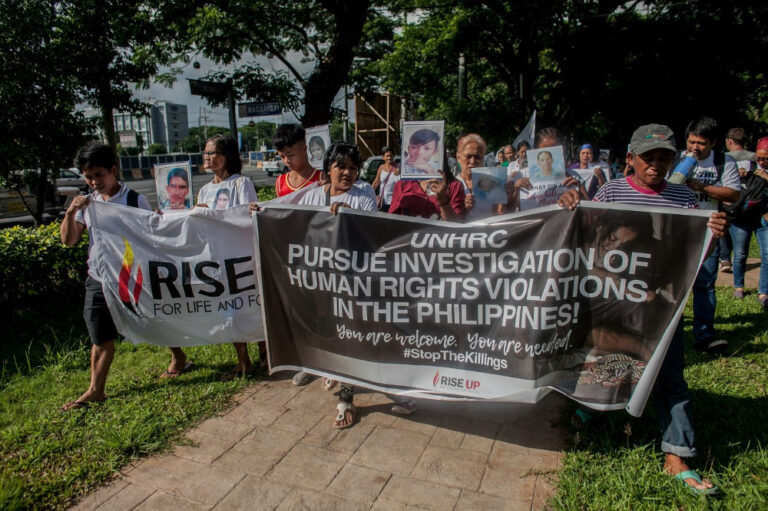
Bella Perez-Rubio (Philstar.com) – December 17, 2020
MANILA, Philippines — A coalition of civil society groups has been formed to conduct an inquiry into alleged human rights violations in the Philippines in response to what they characterize as a severe escalation of abuses in the country.
The Independent International Commission of Investigation into Human Rights Violations in the Philippines (Investigate PH) “is an initiative of peoples from all over the world concerned about the state of human rights in the Philippines,” its website reads.
The project was organized primarily by the International Coalition for Human Rights in the Philippines (ICHRP) and its commission members include high-ranking members of the US-based National Lawyer’s Guild (NGL) and the International Association of Democratic Lawyers (IADL), a former Australian senator, as well as several general secretaries of churches in the US, Canada, and Germany.
The National Union of People’s Lawyers, Karapatan and Rise Up for Life and Human Rights also serve as local partners to the initiative.
“The [UN] High Commissioner for Human Rights Ms. Michelle Bachelet presented a well-researched and documented report of human rights violations in the Philippines to the 44th Session of the UN Human Rights Council in June this year, but the 45th Session took it no further. This is despite the severe escalation of human rights violations we are aware of in the Philippines in 2020,” ICHRP Global Council Chairperson Peter Murphy said in an online media briefing held Thursday.
Philippine government: No EJKs, no climate of impunity
The government has said that it recognizes and protects human rights and earlier this year announced a review of cases where “drug personalities” were killed in operations under the Duterte administration’s “war on drugs.” An initial report of the Department of Justice-led review is expected out this month.
The Philippine government has also maintained that allegations of abuses are a narrative that the political opposition is using to discredit President Rodrigo Duterte. It has also said that rights concerns raised from abroad are an interference in domestic issues.
In June, Justice Secretary Menardo Guevarra told the United Nations Human Rights Council that claims of impunity for killings have “no anchor in a system that provides every avenue to examine, establish and pursue a claim of wrongdoing by a State actor, if such claim is substantiated with facts.”
The justice secretary also called on “human rights mechanisms” to “exercise due diligence in validating allegations brought before them by parties.”
Guevarra went on to say the independence of Philippine courts has been shown in the conviction of retired Army general Jovito Palparan as well as the conviction of members of the Ampatuan clan over the gruesome Maguindanao Massacre in 2009.
The DOJ secretary also said that the Philippine National Police is “obliged by its internal mechanism” to automatically conduct a probe into operations with deaths involved, even if no complainant has come forward.
“Civil society and the international community continue to press for an independent, international investigation. In response, the [ICHRP] has organized InvestigatePH to create a space for the international community to help ensure that justice is served to victims and their families by providing new data to update the Bachelet report, and thus create the favorable climate for the Human Rights Council, the [UN] General Assembly and the International Criminal Court to do their work,” IHCRP’s Murphy said Thursday.
Lawyer Jeanne Mirer, co-chair of progressive bar association NLG, who also serves as president of the NYC chapter of the IADL, said that the findings of the probe would be made available to the UN as well as to the Filipino people and to other governments.
How will the probe be carried out?
NUPL president Edre Olalia, who also serves as IADL transitional president, said one of the objectives of the probe is to determine if tangible domestic remedies and mechanisms are available. If such remedies are available, the probe will then verify if they are able to provide regress and protections against human rights violations.
“The question is: Are these domestic remedies genuine? Are they effective? Are they accessible?” Olalia said at the same virtual briefing.
He also listed the following as the main areas of the inquiry:
- killings, disappearances, arbitrary arrests and detention
- persecution of different sectors
- restriction of freedoms
- killings related to drug trade/drug use
- violations related to the pandemic
- violations of int’l human rights law
“The sources will be varied and very expansive: the victims, the relatives, the sectors, the committees, the human rights defenders, civil society, and even resource persons and experts, and of course the Philippine government and international government and civil society organizations,” he added.
According to Olalia, both face-to-face and virtual interviews would be employed throughout the probe.
He added that the “timeline would be contemporaneous with the three succeeding sessions of the [UN] Human Rights Council in February, in June, culminating in the 40th session in September of next year.”#